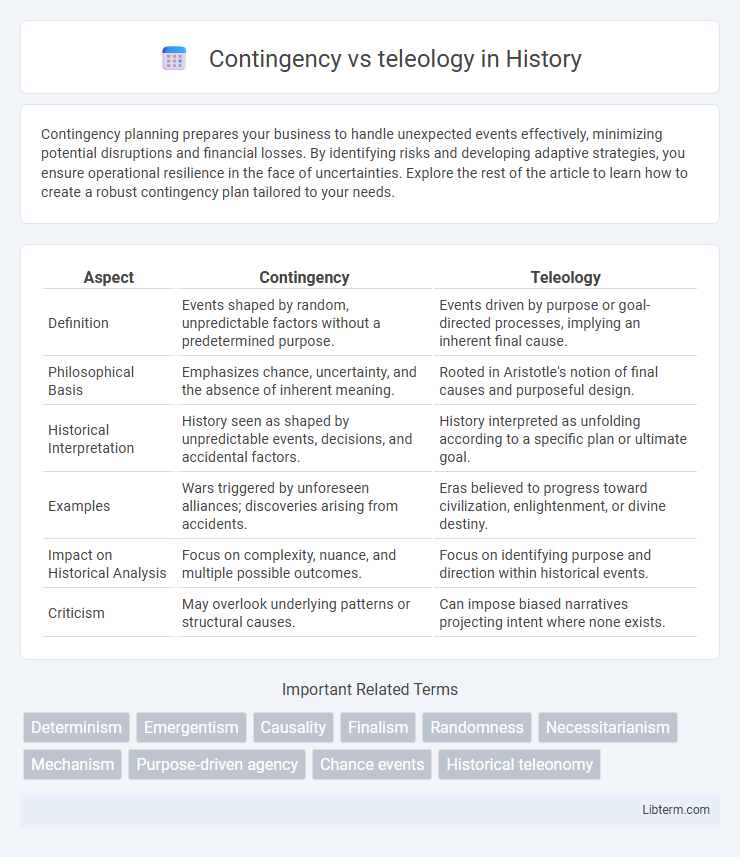Contingency planning prepares your business to handle unexpected events effectively, minimizing potential disruptions and financial losses. By identifying risks and developing adaptive strategies, you ensure operational resilience in the face of uncertainties. Explore the rest of the article to learn how to create a robust contingency plan tailored to your needs.
Table of Comparison
| Aspect | Contingency | Teleology |
|---|---|---|
| Definition | Events shaped by random, unpredictable factors without a predetermined purpose. | Events driven by purpose or goal-directed processes, implying an inherent final cause. |
| Philosophical Basis | Emphasizes chance, uncertainty, and the absence of inherent meaning. | Rooted in Aristotle's notion of final causes and purposeful design. |
| Historical Interpretation | History seen as shaped by unpredictable events, decisions, and accidental factors. | History interpreted as unfolding according to a specific plan or ultimate goal. |
| Examples | Wars triggered by unforeseen alliances; discoveries arising from accidents. | Eras believed to progress toward civilization, enlightenment, or divine destiny. |
| Impact on Historical Analysis | Focus on complexity, nuance, and multiple possible outcomes. | Focus on identifying purpose and direction within historical events. |
| Criticism | May overlook underlying patterns or structural causes. | Can impose biased narratives projecting intent where none exists. |
Defining Contingency and Teleology
Contingency refers to events or states that depend on external circumstances and are not predetermined, highlighting the role of chance and uncertainty in shaping outcomes. Teleology involves explaining phenomena by their intended purpose or goal, emphasizing forward-looking design and function in natural or human processes. Understanding contingency centers on unpredictability and dependence, while teleology focuses on purpose-driven causation and goal orientation.
Historical Perspectives on Contingency and Teleology
Historical perspectives on contingency emphasize the role of chance, unpredictability, and context in shaping events, contrasting with teleology's focus on purposeful, goal-directed processes. Philosophers like David Hume and Karl Popper highlighted contingency by arguing that historical outcomes result from complex, often unforeseeable interactions rather than predetermined ends. In contrast, thinkers influenced by Aristotelian teleology interpreted history as unfolding according to inherent purposes or final causes, suggesting an underlying order guiding human development.
Key Philosophers and Their Views
Key philosophers such as Aristotle championed teleology, arguing that natural phenomena have purposeful ends or goals inherent in their nature. In contrast, thinkers like David Hume and Bertrand Russell emphasized contingency, asserting that events occur without predetermined purposes, highlighting randomness and causal chains instead. Immanuel Kant attempted to bridge these views by suggesting that while nature appears teleological to human understanding, this is a conceptual framework rather than an intrinsic property.
Contingency in Natural Sciences
Contingency in natural sciences emphasizes the role of chance events and unpredictable factors shaping evolutionary processes and ecological dynamics, contrasting with deterministic teleological explanations that imply purpose or predetermined goals. Experimental studies in biology and physics reveal that small variations in initial conditions can lead to significantly different outcomes, underscoring the inherent unpredictability of natural phenomena. This perspective highlights the importance of probabilistic models and stochastic processes in understanding the complexity and diversity of life and natural systems.
Teleology in Classical and Modern Thought
Teleology in classical thought, rooted in Aristotle's philosophy, emphasizes purpose and final causes as intrinsic to natural processes, asserting that everything in nature has an inherent goal or end. Modern thought, influenced by scientific advancements and evolutionary theory, reinterprets teleology as an emergent property or explanatory framework rather than a literal guiding principle, prioritizing functional explanations over predetermined purposes. This shift marks a transition from intentional design in nature to adaptive processes shaped by contingency and natural selection.
Comparative Analysis: Contingency vs Teleology
Contingency emphasizes the role of chance, unpredictability, and external factors in shaping events, while teleology asserts that actions and outcomes are driven by purposeful goals or inherent ends. In comparative analysis, contingency highlights randomness and situational variables as primary explanatory mechanisms, contrasting teleology's focus on intentional design and future-oriented causation. This distinction impacts fields like philosophy, biology, and organizational theory, where explanations either prioritize adaptive responses to unforeseen circumstances or goal-directed processes.
Role in Evolutionary Theory
Contingency in evolutionary theory emphasizes the unpredictability of evolutionary outcomes due to random mutations and environmental changes, highlighting the role of chance events in shaping species' development. Teleology, in contrast, suggests an inherent purpose or goal-directed process driving evolution, which is largely rejected by modern biology in favor of natural selection and genetic drift. The role of contingency underscores evolution as a non-deterministic process, while teleology frames it as goal-oriented, with contemporary science predominantly supporting contingency as the driving mechanism.
Impact on Ethics and Morality
Contingency emphasizes the unpredictability and situational nature of events, leading to an ethics framework that values adaptability and context-specific moral judgments. Teleology centers on purpose-driven outcomes, promoting ethical systems that prioritize goal-oriented actions and the consequences they produce. The impact on morality is significant as contingency fosters flexibility and pluralism, while teleology supports structured principles aimed at achieving predetermined ethical ends.
Contemporary Debates and Applications
Contemporary debates on contingency versus teleology emphasize the unpredictable nature of events versus goal-directed processes in fields like evolutionary biology and organizational theory. Scholars analyze how contingency highlights randomness and context-dependence, while teleology underscores purpose-driven mechanisms influencing outcomes. Recent applications explore integrating these perspectives to better understand complex systems and adaptive strategies in social and natural sciences.
Future Directions in Contingency and Teleology Studies
Future directions in contingency and teleology studies emphasize integrating advanced computational models and big data analytics to better predict organizational behavior under uncertainty. Research increasingly explores the dynamic interaction between contingent variables and teleological agency, aiming to develop more precise frameworks for understanding decision-making processes. Emerging interdisciplinary approaches draw from cognitive science and systems theory to refine theoretical models and enhance practical applications in strategic management.
Contingency Infographic

 libterm.com
libterm.com